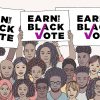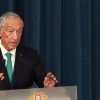Fannie Lou Hamer was born 1917 October 6 in Mississippi in the midst of the racial madness and social mayhem called White supremacy in which walls of brutal separation were built in life and law to imprison and suppress a whole people, and in spite of this, she lifted herself up to look over and beyond those walls, imagining freedom and dared to begin the life-long and heavy task of tearing down those walls and working and struggling for freedom. And in this she has lifted up a light that lasts, left us timeless lessons and a name that endures as an eternal monument for the struggling and freedom-loving peoples of the world.
The lessons of her life are not exhausted in her audacious and uncompromising struggle and defiance at the Democratic National Convention in 1964, but rather expressed in the wholeness of her life, the ordinary and extraordinary, the simple and the complex. And so, although there are numerous lessons to learn from the sacred text of her life, I choose three overarching and essential ones, given added significance in the context of our continuing conversation about the meaning of President Obama’s election that cries out for remembrance and recognition of the path paved by Black people in our historic struggle.
Mrs. Hamer comes into self-conscious being and begins her journey on the road to world recognition when she decides to walk away from the plantation that imprisoned her. She says, “In 1962 nobody knew I existed…and I hadn’t heard of them either. Then one day, the thirty-first of August, I walked off the plantation”. This is her first lesson then—that the will to be free must come from within and that to be free we must walk off the plantation, that is to say, away from the physical and psychological sites that imprison and oppress us. SNCC, the Student Non-Violent Coordinating Committee, had come to launch a campaign for voter registration and Mrs. Hamer had gone to a meeting to hear them speak of freedom. But no matter what they said or did, she had to embrace the idea and possibilities of freedom herself and commit herself to the awesome work and struggle to achieve it. And she had to make up her mind to stay steadfast on the way to freedom in spite of a rough and rocky road, full of signs and sites of casualties and costs of every kind, including the possibility of losing one’s life in the cause of freedom. Indeed, she said death is a daily threat and “I may be killed, but I’ll be standing up for God and my race until my time comes”. But she said, if she falls in battle, it will be “forward in the fight for freedom”.
Secondly, Mrs. Hamer taught us to question America in order to relieve it of its cherished illusions and reconceive and reconstruct it in the interest of a more expansive freedom and human flourishing. For her, this meant questioning the whole country, not just Mississippi, but the North and South, East and West of it. She said, “I question America”, in its claim to be “the land of the free and the home of the brave”, when people are threatened with death daily because they “want to live as decent human beings”, want to exercise the right to vote, dare to imagine themselves equal and believe freedom is the natural and undeniable right of everyone.
For her, ourselves, history and humanity, we also must constantly question America, question its involvement in wanton waste and war and the human wreckage left in their wake. We must question continuing inequities in wealth, power and status, the privatization of social wealth and the socialization of private debt and the violation of civil and human rights in the name of security defined in a context of manufactured fear. And we must question the peddling of a parasitic patriotism that sucks human sensitivity from its hosts and feeds on the false and deforming fears it creates.
But to question America is also to question ourselves and what society has made of us, how we relate to each other and the world, how so many of us are caught in the madness of a consumerist society, finding freedom in our capacity to buy, and assembling countless reasons why we are comfortable in oppression, don’t want to help the hungry and homeless, hate the Palestinians and the people whose countries we invade and whose oil, water and lives we claim as our own, and don’t do more for Darfur or feel a grossly twisted need to humiliate, starve and dominate a small Black country called Haiti. And we must ask why we think Barack is a “funny” name and not Baruch, Obama and not O’Reilly, Takisha and not Tabitha, Chang and Chun and not Chatterley and Cheney, Rain Cloud and not McCloud, Vilakazi and not Van Buren, and Srinivasa and not Schwarzenegger?
To walk away from the plantation, regardless of how comfortable and comforting and to constantly question ourselves and society, leads us to dare to transform ourselves, society and ultimately the world. And this means, Mrs. Hamer taught us, that “every step of the way you’ve got to fight” and that “people have got to get together and work together”. It is, she stated, in our interests, for “nobody’s free until everybody’s free”. And only by working and struggling together, can those who suffer—Africans, Native Americans, Latinos, Asians and Europeans—end their personal and collective suffering, “make this country what it has to be” and “live as decent human beings”.
This last lesson on transformative struggle teaches us that President Obama’s election and others must not be simply symbolic, but approached as vital areas of engagement and struggle for serious social change. Mrs. Hamer says about the significance of one election, “There was nothing symbolic about this election. I’m sick of symbolic things; we’re fighting for our lives”. Thus, for Obama’s past election and current presidency to be more than a useful symbol for a country unable to criticize and seriously change itself, it must be part and parcel of our struggle to save and expand lives. And if “we are fighting for our lives”, we must do as Mrs. Hamer, lift ourselves above the walls and ways of self and social imprisonment, walk away from the various plantations of social pain and consumer pleasure, constantly question ourselves and society, imagine a new world and in the process of self and social transformation, open the way for a new history and humanity to emerge”.















